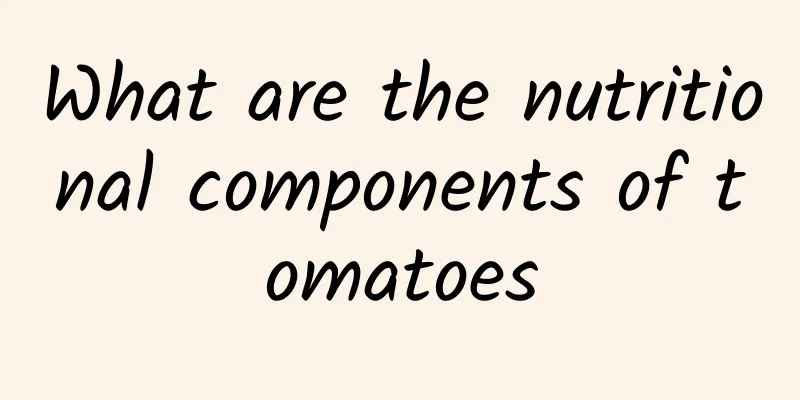What are the nutritional components of tomatoes

|
Here is an introduction to the nutritional value of tomatoes. After understanding, you can eat it better: 1. LycopeneTomatoes, apricots, watermelons, papayas and other foods all contain lycopene, but tomatoes have the highest lycopene content. It is a member of the carotenoid family, with an antioxidant capacity twice that of beta-carotene, and its rate constant for quenching singlet oxygen is 100 times that of vitamin E. It is one of the strongest antioxidants found in nature so far; as an antioxidant, it can reduce the attack of free radicals on cells, thereby preventing aging, reducing the risk of heart disease and certain cancers. Observational studies on a large number of people in many countries have shown that people with high blood lycopene levels have a low risk of certain cancers (especially lung cancer, gastric cancer and prostate cancer). An article published in the authoritative journal "Cancer Epidemiol Biomarkers Prev" in 2004 summarized 21 observational studies and concluded that tomato products (mainly tomatoes and products made from tomatoes) have the effect of preventing prostate cancer. So how can we eat tomatoes to get the best effect of lycopene? Studies have shown that eating cooked tomatoes is better than eating raw tomatoes or drinking tomato juice. This is mainly based on the following two points: cooking breaks the cell wall of tomatoes, releasing lycopene and facilitating its absorption; lycopene is a fat-soluble phytochemical, and the oil in cooking can promote the absorption of lycopene. Therefore, it is recommended that you eat cooked tomatoes. Tomato scrambled eggs, tomato egg custard, tomato egg soup, and tomato beef brisket are all good choices. 2. High moisture, low fatLike most other fruits and vegetables, tomatoes have high water content and low fat content. However, raw tomatoes are sour and can irritate the stomach and intestines. People with poor gastrointestinal function should try to eat them cooked. I would like to recommend a simple and time-saving way to eat tomato and egg custard to my friends. The specific steps are as follows: Beat the eggs, add boiling water of the same amount as the eggs, sprinkle a little salt, stir well; then put the sliced tomatoes in, put them directly into the microwave, and cook on high heat for two minutes. This can avoid the irritation of raw tomatoes to the gastrointestinal tract. 3. Other carrotsIn addition to lycopene, tomatoes also contain carotenoids such as α-carotene and β-carotene, which can be converted into vitamin A in the body, thus contributing to the health of vision, mucous membranes, skin and bones. These carotenoids have the same properties as lycopene (soluble in fat). To better obtain carotenoids, it is recommended to eat them cooked. In addition, chewing them slowly is also conducive to the release of lycopene. 4. Vitamin CAccording to the Food Composition Table, the vitamin C content of tomatoes is 19mg/100g, which is about 5 times the average content of apples (4mg/100mg), but less than kiwis, citrus fruits, and fresh dates. High temperatures can destroy vitamin C, but ordinary cooking and frying destroys about 10% of vitamin C. In order to fully obtain the lycopene in tomatoes, it is recommended to eat tomatoes cooked, and the reduced vitamin C intake can be supplemented by other foods. 5. Other vitaminsIn addition to provitamin A and vitamin C, tomatoes also contain some folic acid, vitamin B1, niacin, and vitamin B2, which are all essential nutrients for human metabolism. 6. MineralsTomatoes are rich in potassium, with 163 mg of potassium in 100 g of tomatoes and only 5 mg of sodium. Potassium ions are good for heart health and blood pressure control. In addition, they also contain some iron, calcium, manganese, etc. Among them, iron is trivalent iron, which can be converted into divalent iron with the help of vitamin C in tomatoes, thereby increasing its absorption rate. To sum up: the most wonderful nutrition in tomatoes is lycopene, whose strong antioxidant properties can reduce the risk of prostate, stomach and lung cancer. Lycopene, vitamin C and carotene work together to prevent oxidation and delay aging. The high water content and low fat content are good for weight control; the high potassium content is good for blood pressure control. Tomatoes are sweet and sour, suitable for all ages, and it is recommended to have tomatoes on the table every day. |
>>: Tomato Soy Milk Weight Loss Method
Recommend
The efficacy and function of dried ginger
Let me explain to you the effects and functions of...
Nutritional value of peaches
Everyone has read Journey to the West, right? In ...
Side Effects of Purslane
Portulaca oleracea is a wild plant. We seldom kno...
The efficacy and function of boiled water with water chestnuts The taboos of boiled water with water chestnuts
When fresh water chestnuts are on the market in l...
The real reason why rhubarb rice is bitter and the taboos of rhubarb rice
Rhubarb rice is a very popular food in life. It i...
How to cook minced meat and eggplant
Today I will share with you several methods of co...
Will eating betel nut cause impotence?
Will eating betel nut cause impotence? I believe ...
The efficacy and function of convex stalks
The tangerine peel is a tropical and subtropical ...
How to grow yew? Cultivation methods and precautions for yew
Yew is a precious plant with high ornamental and ...
How to clean clams and how to remove sand from clams
Clams are the most common seafood ingredients. Th...
How is Africa Times? Africa Times review and website information
What is Africatime? Africatime.com is a famous new...
The efficacy and function of raw potato juice
Raw potato juice is a kind of juice squeezed from...
Eat porridge to keep healthy in winter
When it comes to health preservation in winter, e...
How to identify whether bamboo shoots are spoiled
Bamboo shoots are the young shoots of bamboo. The...
How is the Hebrew University of Jerusalem? Reviews and website information of the Hebrew University of Jerusalem
What is the website of the Hebrew University of Je...









